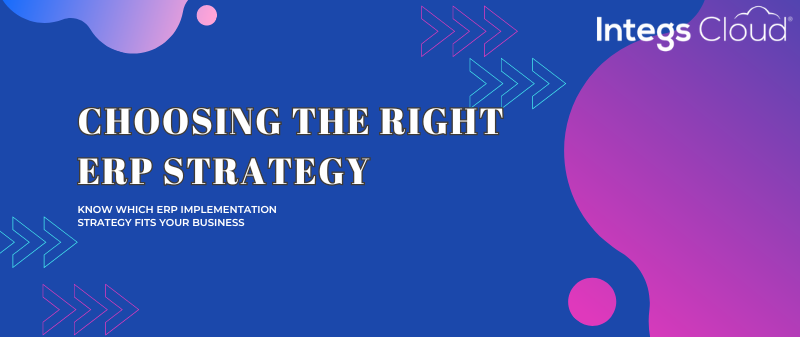ERP for Finance is an integral cog in the future of a business’s growth wheel. Here is how.
Inaccuracies and errors in your financial reports are a headache. With the year-end period closing, the amount of time, resources, and efforts that go into curating these records can far exceed profits. Plus for multi-subsidiary companies that have extensive finance operations under them, one single manual mistake can cause unwanted confusion and mayhem.
When you sit down to come up with a financial strategy that requires cost-based decisions, having these automated records on a single page can help you pinpoint the exact date or data you want in a few clicks. That’s the magic Oracle NetSuite’s ERP financial systems and solutions provide! From resolving period and date mismatches to adding or deleting transactions, to accommodating foreign currencies to balance them, ERP for finance is the way forward!
Financial ERP software allows you to laser-focus on and improve your processes. You can handle daily tasks, regardless of the size of your company. It also has features that allow the accommodation of multi-subsidiaries. For example, international subsidiaries with different closing periods can operate at the same time on a singular platform!
The biggest boon of ERP for finance lies in getting a translation of your data into meaningful insights, which is crucial while making big financial decisions. Here are 4 major reasons to consider introducing Oracle NetSuite’s ERP solutions to your business operations!
4 reasons why CFOs need Oracle NetSuite ERP for Finance:
1. Financial Consolidation
From mid-level organizations to large-scale multi-entity businesses, having entire financial data in a centralized manner is extremely crucial. Every single data pointer holds utmost importance, from financial data from minute accounting details to suspense entries, and from budget vs actuals to actual financial planning.
Having this very data in a consolidated way helps organizations make the right financial decisions and get complete clarity about their financial transactions. Getting every transparent transaction at both subsidiary and parent levels simultaneously helps organizations store data in a synchronized way.
With a robust ERP solution like Oracle NetSuite, smooth financial consolidation offers deeper data insights, greater control, reduced risks, and increased efficiency.

2. Book Closing
For book, period, and year-end closing, many times the dates of the records can cause a problem. Imagine you are closing a period at the end of the month, and the next Monday you receive a receipt for the month you just closed. In this case, you can still add this transaction to your period while marking it as a special case with Oracle Netsuite. In the long run, this mismatch won’t be marked as a blunder.
Further, you can also get all the date-period mismatched at a single glance. While these might not necessarily be mistakes, Oracle NetSuite’s ERP for finance helps you be aware of them, so you know which months might have records from other months.
The NetSuite ERP financial system also comes with features that help you resolve these mismatches or mark them as complete without making any edits. With a few clicks, you can also access all the items that are left for calculations over your entire fiscal year. Find out if you have the unclosed AP, AR, and G/L transactions over your periods at a single glance.
A few more features of ERP include adding your customer’s PO number, updating the contact information after the period ends, or marking certain records as inactive so that they exist in the system, but don’t show up in your database.
3. Reporting Analysis
Year-end reports help a company analyze its financial performance and introduce changes if necessary. First and foremost, you get an accurate consolidated financial report. Let’s say you have various companies under a broader one. These inter-company transactions can’t show up on a consolidated level. NetSuite’s elimination of intercompany transaction tasks gets rid of them for you!
Another way NetSuite helps you is with its foreign currency balance feature. If you have subsidiaries from different countries, recording their transactions can be confusing. While carrying out general ledger closing, NetSuite opens these balances and adjusts them based on the set currency rate, allowing multiple currencies to exist in your environment.

4. Real-Time Reporting & Visibility Across Organizations
Usually, many organizations have to wait till the end of the month to get access to financial data pointers. With financial ERP software, you can avail access to purchase data at any and all times! The real-time reporting tool that comes with ERP helps you refer to these data pointers even in the middle of the night!
These tools also perform real-time spending analysis, thus positively accelerating your financial agility. Further, a crystal clear vision across all your organizations only helps in managing your business better, leading to better financial decisions, and improved growth strategies
Final Words:
With the passing of the financial year-end, your company can truly automate business financial processes with ERP for Finance. With Oracle NetSuite, financial report generation, cash flow management, working capital management, etc. can be streamlined for enhanced financial planning. You can make better budget estimation and forecasting, optimize operations, and in turn, improve business partner relationships to boost your business data integrity! But you can also go beyond traditional ERP solutions with Integs Cloud. With domain expertise in finance, and accounting, we offer tailor-made solutions through our experience of 20+ years as a NetSuite solution provider. Consult with us today.



